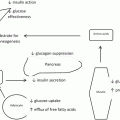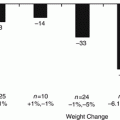Fig. 11.1
Mechanisms and comparisons of each of the three major bariatric procedures
Bariatric surgery provides additional benefits through improvements in other obesity-related co morbidities—e.g., dyslipidemia and obstructive sleep apnea. Additionally, health-related quality of life improves, symptoms of depression are reduced, and other psychosocial benefits are noted. Several studies have shown improvements in survival—specifically, reduced mortality from cardiovascular disease, cancer in women, and type 2 diabetes itself [19–21]. Available analyses suggest that bariatric surgery is cost effective and, in some circumstances, reduces health-care costs [22]. Despite these findings, surgery is underutilized; fewer than 1 % of patients eligible for surgery are treated each year. Reasons include stigmatization and discrimination against obese people and methods to treat obesity, professional boundaries (i.e., thinking of diabetes as a medical rather than surgical disorder), little awareness of surgical options in patients and physicians, barriers to access to surgical care, cost, and concerns about effectiveness and risks.
The growing body of evidence that weight loss achieved through bariatric surgery produces health benefits, improving quality of life and reducing health care costs is hard to dismiss by health care providers. Whether the patient chooses a gastric band, bypass or sleeve is a matter for each individual patient to choose in conjunction with advice from their surgeon. Advocates of each surgery are able to produce convincing results for their preferred procedure and it is now accepted by the surgical body that each procedure is only as good as the correct patient selection, technical proficiency in carrying out the surgery safely and offering close follow-up in conjunction with the patient’s primary care physician and whole team.
References
1.
Tham JC, Howes N, le Roux CW. The role of bariatric surgery in the treatment of diabetes. Ther Adv Chronic Dis. 2014;5(3):149–57.PubMedCentralCrossRefPubMed
2.
Ginter E, Simko V. Diabetes type 2 pandemic in 21st century. Bratisl Lek Listy. 2010;111(3):134–7.PubMed
3.
4.
Picot J, Jones J, Colquitt JL, Gospodarevskaya E, Loveman E, Baxter L, et al. The clinical effectiveness and cost-effectiveness of bariatric (weight loss) surgery for obesity: a systematic review and economic evaluation. Health Technol Assess. 2009;13(41):1.CrossRef
5.
Mingrone G, et al. Bariatric surgery versus conventional medical therapy for type 2 diabetes. N Engl J Med. 2012;366(17):1577–85.CrossRefPubMed
Stay updated, free articles. Join our Telegram channel

Full access? Get Clinical Tree





